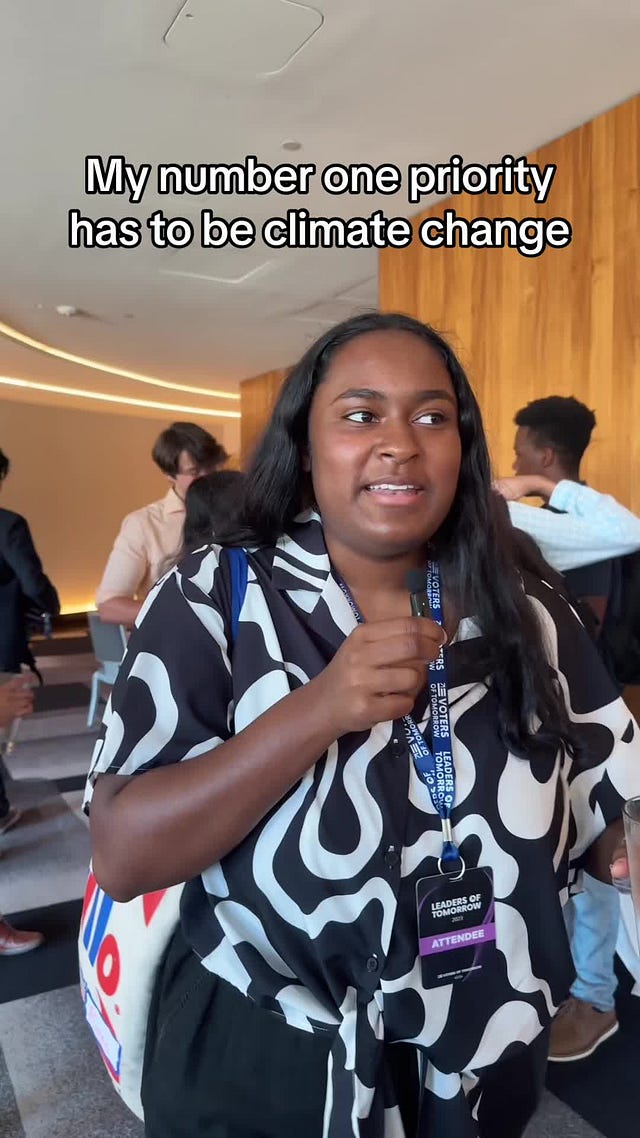Pushing back against an 'assault on Gen Z rights'
A dispatch from Voters of Tomorrow's 'Leaders of Tomorrow' summit - a mind meld for organizers looking to boost youth voter turnout in the 2024 election.
Amid record hot temperatures in Washington, D.C., throngs of politically savvy and sweaty young people flocked to the Watergate Hotel last Thursday for the first day of Voters of Tomorrow’s ‘Leaders of Tomorrow’ summit. Opting to trade Instagram handles in lieu of business cards (though for the first time in a while I walked away with an IRL paper card, too), young politicos — nearly 175 of them, to be exact — networked ahead of the kickoff night’s keynote speaker session that would feature former House Speaker Nancy Pelosi, White House Press Secretary Karine Jean-Pierre, Reps. Maxwell Frost (the youngest member and first Gen Zer in Congress), Jamaal Bowman, Robert Garcia, and Summer Lee, Tennessee state Rep. Justin Jones (one the youngest lawmakers in the state), and North Carolina Democratic Party Chair Anderson Clayton (the youngest state party leader in the country). With a subtle first-day-of-school jitters vibe, the energy was palpable, though not quite as thick as the humidity. Featuring networking sessions, workshops, speakers, and panels, this weekend’s summit — the group’s second annual — served as a mind meld for organizers looking to boost youth voter turnout in the 2024 election.
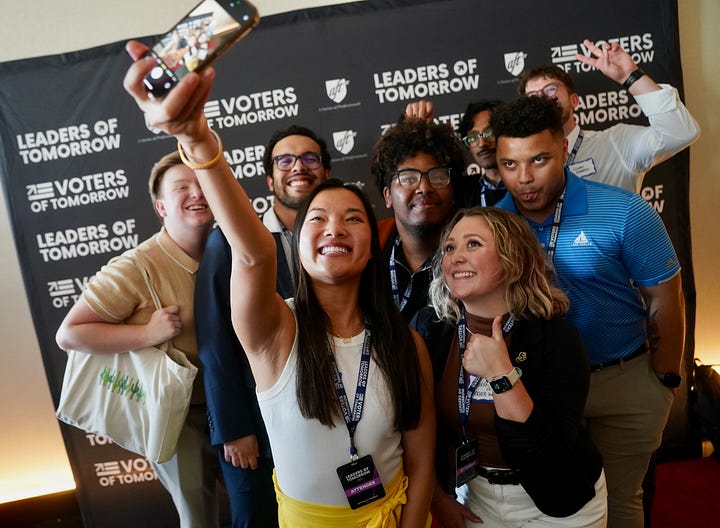

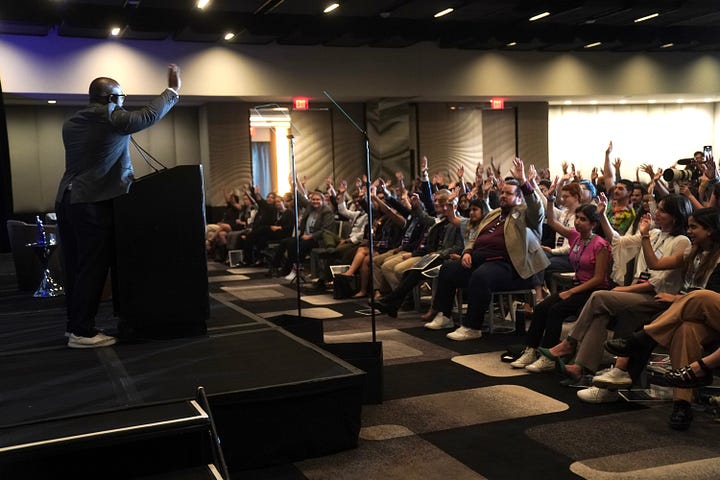
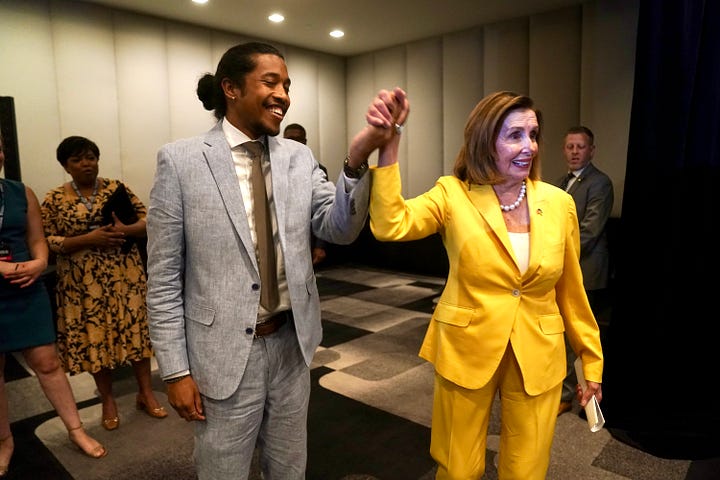
What is Voters of Tomorrow (VOT)?
The three-year-old organization got its start in 2020 after a cutesy ‘Prom at the Polls’ initiative, when high schooler Santiago Mayer and a group of others who missed their senior proms due to Covid-19 held a virtual prom-themed event to engage and register young voters. Since then, VOT has built a chapter-based network with hubs in 20 states and volunteers in all 50. Through phone banks, text banks, and collaboration with other youth-focused groups, the organization has become a leader in the youth vote space, gaining national attention when it worked to drive youth turnout and then later went viral for highlighting the role young voters played helping Democrats secure key victories in the 2022 midterms. Since then, members of the VOT team have become regulars on MSNBC and are in consistent touch with high profile Democrats — on Capitol Hill, in the Biden Harris administration, and at the Democratic National Committee.
The ‘Leaders of Tomorrow’ summit was sponsored by the American Federation of Teachers, Building Back Together, Currant, and the Lincoln Democracy Institute.
Behind the ‘Leaders of Tomorrow’ summit
Though young voters historically lean to the left, it’s no secret that today’s Republicans are especially struggling to court the youth vote as Democrats champion issues like gun safety, climate change, abortion access, and college affordability. At the same time, Republicans are actively working to restrict youth voting access and GOP presidential candidate Vivek Ramaswamy has proposed raising the voting age. So while VOT is a nonpartisan organization, by focusing on issues important to young Americans, its members and allies are mostly Democrats.
In an op-ed for USA Today over the weekend, VOT’s founder Santiago Mayer painted the Leaders of Tomorrow summit this weekend as an alternative to the right’s Turning Point Action Conference — a hub for young Republicans that’s served as a pulpit for high profile Republicans including the likes of former President Donald Trump.
Asked the biggest issues ahead of 2024, Mayer told me: “The big one, that kind of encompasses all others, is youth rights. We have been facing a full on assault on Gen Z rights, whether that’s book bans, whether that’s assaults on abortion rights, whether that is even just the Supreme Court striking down debt forgiveness.”
Along those lines, Mayer called out Republicans who refuse to find solutions on issues that matter to young Americans in his piece for USA Today, writing, “What makes Gen Z so unique is that we put love and inclusivity first. Our youth-led movement will not be deterred by far-right leaders who claim to value young voices but, behind the scenes, actively work to suppress us. In response to attacks on our generation, we are building a sustained movement across the nation that fights back against their agenda.”
On the heels of high youth voter turnout in the past three election cycles, and as politics and policy (or the lack thereof) continue to tangibly impact young Americans lives when it comes to gun violence, abortion access, climate change, college affordability, education, and more, VOT’s hoping young voters will once again turn out in high numbers and this weekend got the creative juices flowing for their strategic organizing.
“As we get closer to the election, the 2024 election, we have to recognize that young voters, we are incredibly pivotal,” said Raghav Joshi, head of special projects for VOT and the key facilitator in charge of the logistics for the summit. “We need to prepare, connect, collaborate, and just share a space ahead of that.”
It’s worth noting that both Joshi and Mayer can’t actually vote (yet). As immigrants who grew up during the Trump-era and witnessed inflammatory rhetoric towards people like them that came with it, both young men found themselves wanting to do something to push back and turned to organizing other young people who could make their voices heard at the ballot box.
A couple key summit moments
For many at the summit, Rep. Maxwell Frost, who worked as an organizer at both March For Our Lives and the American Civil Liberties Union, is a contemporary and for some, a close friend. His presence in Congress gives other young organizers a voice and, perhaps, a blueprint for their own futures. Frost’s speech hinged on the power of organizing and detailed his own political coming of age (which started after the Sandy Hook elementary school shooting) — a story not unlike many others in the room.
And there was a viral moment during an address from Press Secretary Karine Jean-Pierre. In the midst of her remarks, after telling attendees that the Biden Harris administration recognizes and appreciates young leaders’ ability to create change, Jean-Pierre was interrupted by Elise Joshi (no relation to Raghav), a climate activist and the executive director of Gen Z for Change. Members of VOT tried to stop Joshi in her tracks one she stood up to interject, but Jean-Pierre said “let her talk.” Joshi asked the administration to “stop approving new oil and gas projects,” and delivered a plea for further climate action from President Joe Biden. Before pointing to and defending the administration and the president’s action on climate, Jean-Pierre told Joshi, “I appreciate your courage… I can hear it in your voice.”
With her response, Jean-Pierre said the president “has taken more action on climate change than any other president, he has an ambitious policy,” before adding, “there’s always more work to be done, he’s going to continue to be ambitious, he’s going to continue to take action.”
“When I was hearing the progressive leaders speak before hand, every speech was about courage, you needing to stand up and be bold. And when the White House Press Secretary literally said ‘stand up’ in the beginning of her speech, I realized I only wouldn’t because I was scared,” Joshi told The Up and Up about her interruption.
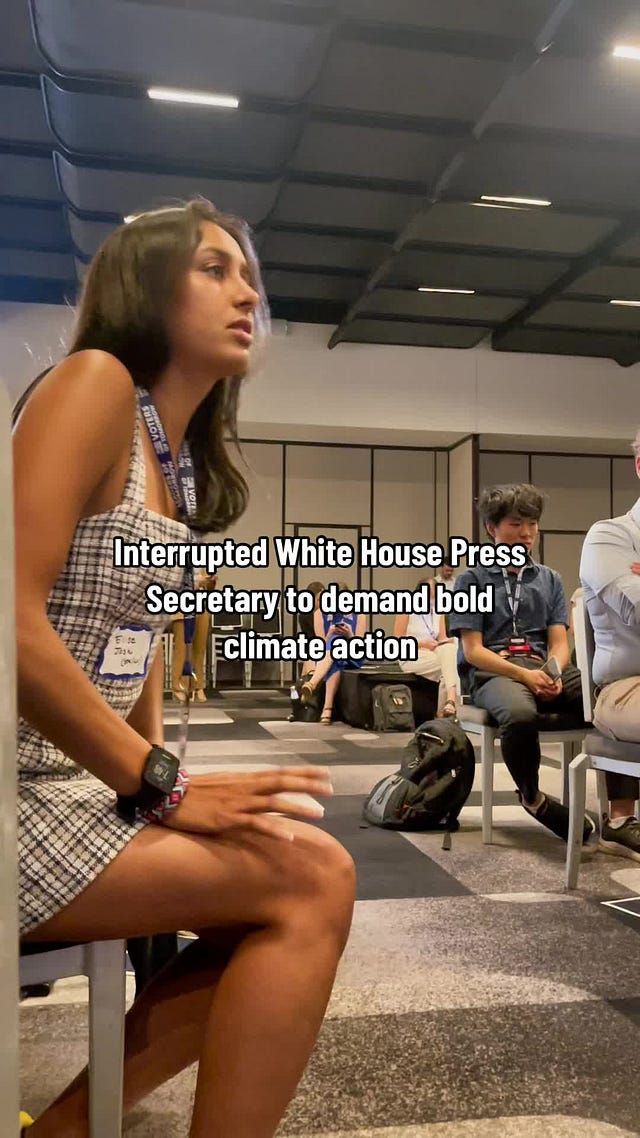
 Tiktok failed to load.
Tiktok failed to load.Enable 3rd party cookies or use another browser
Though it came as a surprise to VOT, Joshi’s interruption didn’t come out of no where. This winter, Joshi helped spur the #StopWillow TikTok campaign that urged the president to halt The Willow Project, a ConocoPhillips oil drilling project in Alaska. Her post went viral and sparked a full throttle crusade (both on and offline, over one million letters were sent to the president) to prevent the drilling project — though the project was ultimately approved. Prior to interrupting Jean-Pierre Thursday, Joshi spent the day on Capitol Hill calling for a climate emergency with progressive climate leaders such as Senator Ed Markey and Rep. Summer Lee. A team filmed Joshi’s interruption on Thursday and the video has four million views on TikTok.
Spotted at the Leaders of Tomorrow summit
Beyond key faces from the Democratic party, according to VOT, attendees who signed up were affiliated with groups like: March For Our Lives, Sunrise Movement, TEAM Enough, Generation Ratify, YouthInGov, Vote16 USA, Path to Progress, Gen Z for Change, The White House, U.S. House of Representatives, the Iowa state legislature, Nassau County Young Democrats, North Carolina Democratic Party, D.C. Young Democrats, Queens County Young Democrats, Harris County Young Democrats, Virginia Young Democrats, George Washington University College Democrats, Students Against Santos, Women In Politics, New Media Ventures, Pennsylvania College Democrats, and so many more.
I alone spoke with attendees from Pennsylvania, Maryland, New York City, Michigan, Massachusetts, New Jersey, Oklahoma, Iowa, Washington, California, and Florida — all of whom worked in some capacity in youth or politics.
On the docket
Throughout the weekend, panels included:
Digital communication with political communications and digital media specialist Annie Wu Henry, abortion rights advocate Olivia Julianna, and Media Matters for America’s Kat Abu
Polling Gen Z with director of polling at the Harvard Kennedy School Institute of Politics and author of FIGHT: How Gen Z is Channeling Their Fear & Passion to Save America, John Della Volpe, VOT strategy director Victor Shi, and founder of The Generation Lab, Cyrus Beschloss
Gen Z in Leadership with New York City Council Member Chi Ossé, Medford City Councilor Justin Tseng, and Houston community organizer (who previously ran for Houston city council) Isaiah Martin
There was also a live podcast recording for ‘On The Move’ with host Victor Shi and former Alabama Senator Doug Jones, as well as networking sessions and break out sessions on power mapping and legislative strategy.
Tidbits from speakers
Ahead of his on-stage conversation with Shi, I asked former Sen. Doug Jones his strategy for engaging with young people in the south, especially young people who may not be thinking about politics in their everyday lives.
“You got to go where people are… especially with young people, people seem to always try to preach to them instead of engaging,” Jones said. “What I want to do is just try to talk and engage and get folks to understand that you can't always get everything that you might want. I think that's the biggest problem we've got in American politics today. And it's generational, but it's also partisan. People are very prone to saying, ‘If I don't get everything I want, then I don't want anything,’… So I think the main thing for folks right now, the political parties, but particularly Democrats, is just to go directly and engage people where they are, and listen, that's the key. Don't just talk, listen.”
And before her panel, I chatted with Annie Wu Henry about her work on and off social media.
“There's not a generation before us who has gone through this,” Wu Henry said about navigating the digital activist space while working in politics. “There's a lot of positives to being visible on your own online presence, but at the same time so much of this work is about the principal and the campaigns that you don't want to take away from that. It's a delicate line that we're trying to figure out how to walk.”
“I hope that people come away [from the panel] understanding that the people who are doing this, whether on their personal capacity or the professional capacity, or both, that it takes a lot of time and effort and skill and strategy to be able to effectively use these spaces,” she said.
Takeaways from attendees
Giuseppe DiStefano, 20, said he’s working on getting more young Democrats engaged in Pasco County, Florida as president of the Pasco Young Democrats. He heard about the summit on Instagram and decided to apply. Asked the biggest issues ahead of 2024, he said “academic freedom and urban planning.”
Elijah King, 21 and 3rd Vice Chair of the North Carolina Democratic Party, and Nate Linville, 19 and state council chairman of the College Democrats of North Carolina, said they’re focused on traveling to counties and college campuses to engage with young North Carolinians.
“I think one of the great things about being a young person in politics right now is that it’s very easy to energize other young people because often times all it takes is to see another young person doing it. A lot of people want to be involved and sometimes don’t know how or have the connections. We are going to be traveling the state this fall and be on every single college campus that we can be,” Linville said. He referenced a recent Politico article about the ability college voters have to swing elections and called UNC Asheville a “blue dot in a red sea.”
Writer’s note: An earlier version of this post said Olivia Julianna is affiliated with Gen Z for Change, but she’s no longer with the organization.



